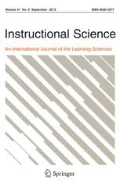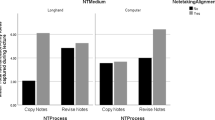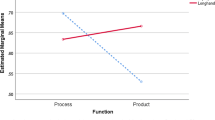Abstract
Previous research investigating the encoding, encoding-plus-storage, and extermal-storage functions of note taking has failed to equate processing opportunities among the groups. The present studies did so by having the encoding group take notes on two occasions without review, the encoding-plus-storage group take notes one time and review notes the next, and the external-storage group twice review a set of borrowed notes. Three forms of note taking were used: conventional, and note taking on skeletal and matrix frameworks. In both Experiment 1, involving lecture learning, and Experiment 2, involving text learning, an advantage was found for the encoding-plus-storage function on tests involving factual-recall and recognition performance but not on tests measuring higher-order performance. With respect to note-taking forms, no advantage existed for any form when information was acquired from lecture. When text material was used there was some advantage for conventional notes and a clear advantage for not taking notes at all, but instead twice reading the material. These findings were explained relative to observed note-taking behaviors, the opportunity for review, and the processing demands proposed by the combination of reading and note taking, particularly when notes must be classified into an existing framework.
Similar content being viewed by others
References
DiVesta, F. J. and Gray, S. G. (1972). Listening and note taking. Journal of Educational Psychology, 64, 278–287.
Hartley, J. and Cameron, A. (1967). Some observations on the efficiency of lecturing. Educational Review, 20(30), 3–7.
Hartley, J. and Fuller, H. (1971, August/September). The use of slides in lectures: an exploratory study, Visual Education, 39–41.
Howe, M. J. (1970). Using students' notes to examine the role of the individual learner in acquiring meaningful subject matter. Journal of Educational Research, 64, 61–63.
Kiewra, K. A. (1985a). Investigating note taking and review: a depth of processing alternative. Educational Psychologist, 20, 23–32.
Kiewra, K. A. (1985b). Learning from a lecture: an investigation of note taking, review and attendance at a lecture. Human Learning, 4, 73–77.
Kiewra, K. A. (1985c). Students' note taking behaviors and the efficacy of providing the instructor's notes for review. Contemporary Educational Psychology, 10, 378–386.
Kiewra, K. A. and Benton, S. L. (1988). The relationship between information-processing ability and note taking. contemporary Educational Psychology, 13, 33–44.
Kiewra, K. A., DuBois, N. F., Christian, D., McShane, A., Meyerhoffer, M. and Roskelley, D. (1988, April). The encoding and external storage effects of three note taking techniques. Paper presented at the annual meeting of the American Educational Research Association, New Orleans, LA.
Kiewra, K. A., DuBois, N. F., Christian, D. and McShane, A. (1988). Providing study notes: a comparison of three types of notes for review. Journal of Educational Psychology, 80, 595–597.
Kintsch, W. and van, Dijk, T. A. (1978). Toward a model of text comprehension and production. Psychological Review, 85, 363–394.
Mayer, R. E. (1984). Aids to text comprehension. Educational Psychology, 19, 30–42.
Riley, J. D. and Dyer, J. (1979). The effects of note taking while reading or listening. Reading World, 19, 51–56.
Tulving, E. (1983). Elements of episodic memory. London: Oxford University Press.
Author information
Authors and Affiliations
Rights and permissions
About this article
Cite this article
Kiewra, K.A., Dubois, N.F., Christensen, M. et al. A more equitable account of the note-taking functions in learning from lecture and from text. Instr Sci 18, 217–232 (1989). https://doi.org/10.1007/BF00053360
Issue Date:
DOI: https://doi.org/10.1007/BF00053360




